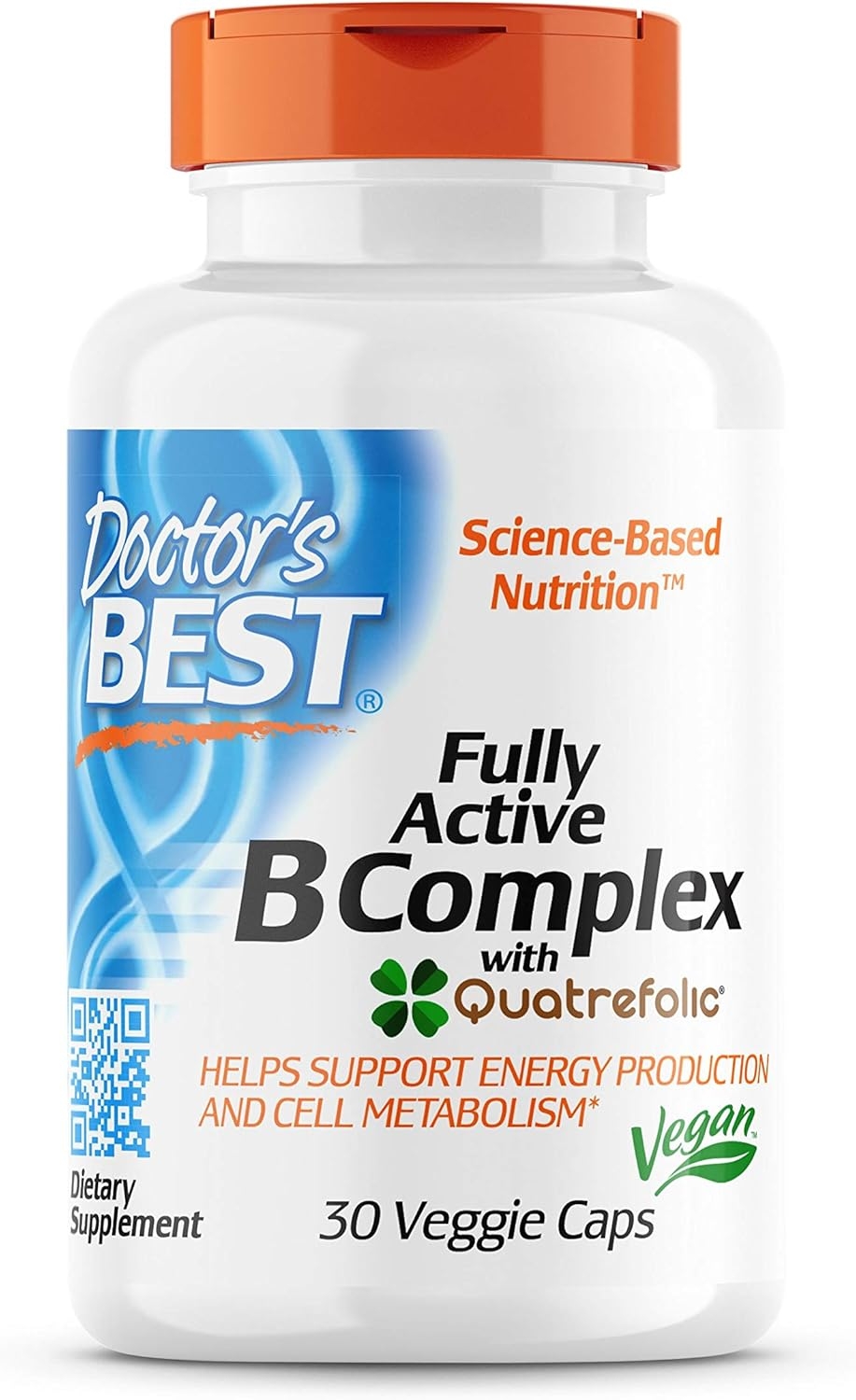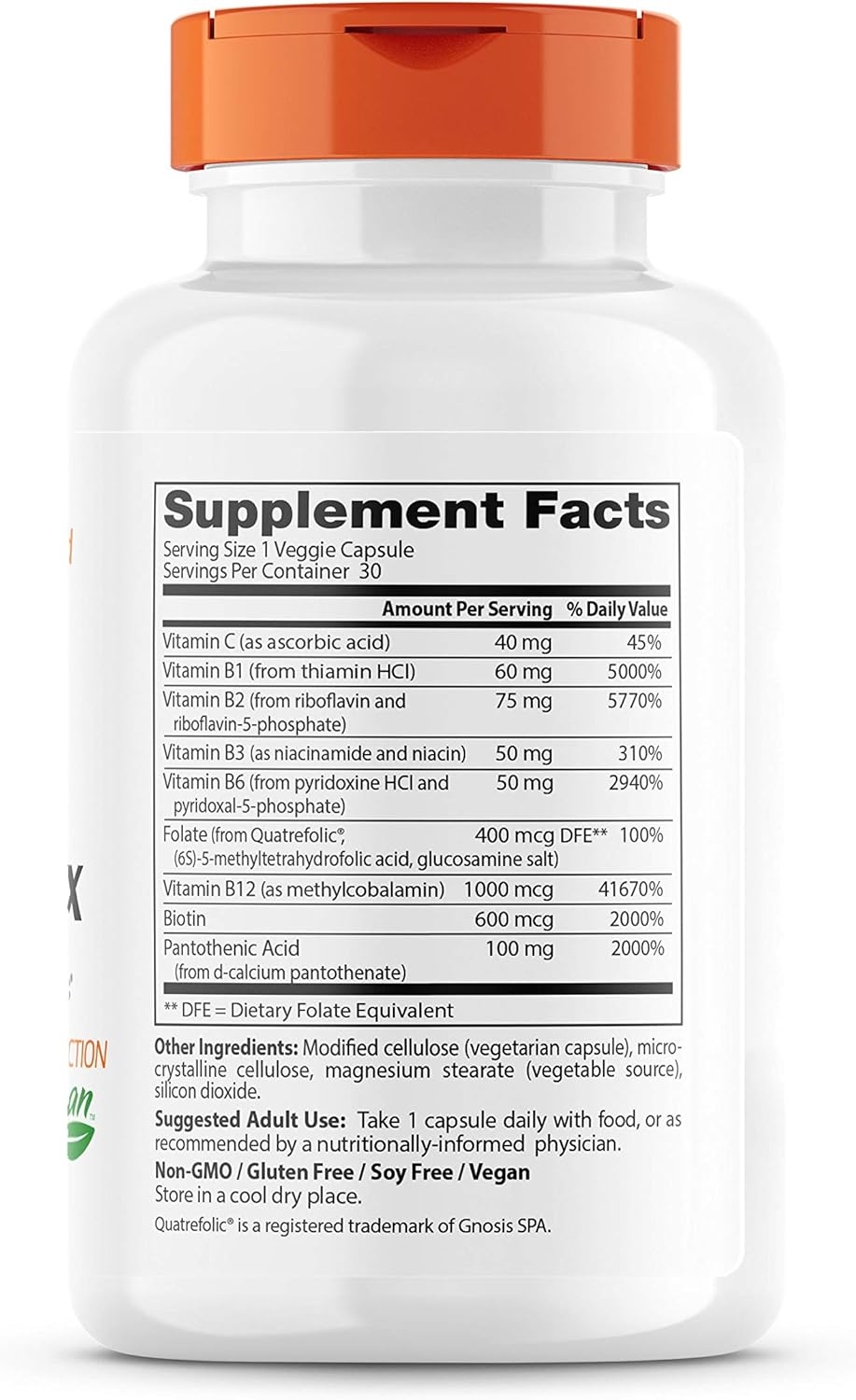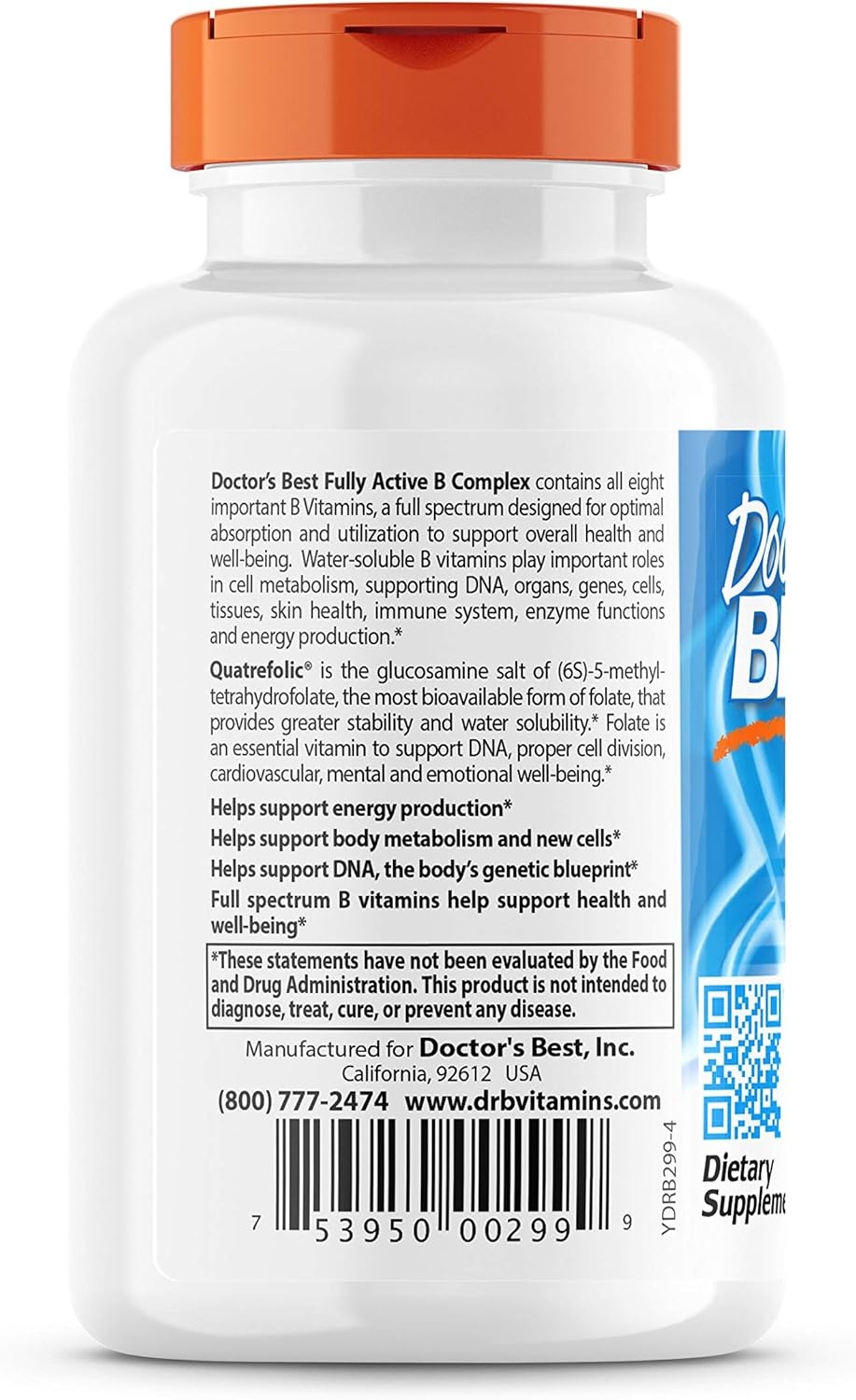- FULLY ACTIVE B COMPLEX – contains all eight important B vitamins – full spectrum designed for optimal absorption and utilization to support overall health and well-being. Water-soluble B vitamins play important roles in cell metabolism, supporting DNA, organs, genes, cells, tissues, skin health, immune system, enzyme functions and energy production.*
- Product Note: Exposure to heat or sunlight may lead to melting/damage of product. Hence customers are expected to be available during the product delivery
- CONTAINS QUATREFOLIC – is the glucosamine salt of (6S)-5-methyltetrahydrofolate, the most bioavailable form of folate, that provides greater stability and water solubility.* Folate is an essential vitamin to support DNA, proper cell division, cardiovascular, mental and emotional well-being.*
- CONTAINS QUATREFOLIC – is the glucosamine salt of (6S)-5-methyltetrahydrofolate, the most bioavailable form of folate, that provides greater stability and water solubility.* Folate is an essential vitamin to support DNA, proper cell division, cardiovascular, mental and emotional well-being.*
- ENERGY SUPPORT – provides B vitamins that work together to convert food into energy. Helps support proper metabolism of carbohydrates, fat, and protein.*
- NERVOUS SYSTEM SUPPORT – helps support nerve function.* Vitamin B6 (pyridoxine HCl and pyridoxal 5′ phosphate) supports a healthy nervous system. Vitamin B6 is vital for early brain development and for the metabolism of various brain chemical transmitters. Nerve cells both in the brain and elsewhere in the body rely on Vitamin B6.*
- CLINICAL RESEARCH – shows that B vitamins are important for DNA and protein synthesis and therefore healthy cell growth and development.* This full spectrum supplement is fully optimized for safety and efficacy and is an excellent way to ensure that the body’s needs for B vitamins are being satisfied..During the summer months products may arrive warm but Amazon stores and ships products in accordance with manufacturers’ recommendations, when provided.



From the manufacturer

Fully Active B Complex is a full-spectrum B vitamin supplement
 *These statements have not been evaluated by the FDA. This product in not intended to diagnose, treat, cure or prevent any disease.
*These statements have not been evaluated by the FDA. This product in not intended to diagnose, treat, cure or prevent any disease.
*Quatrefolic is a registered Gnosis SPA.
Contains all eight important B Vitamins, a full spectrum designed for optimal absorption and utilization to support overall health and well-being. Water-soluble B vitamins play important roles in cell metabolism, supporting DNA, organs, genes, cells, tissues, skin health, immune system, enzyme functions and energy production.*
Quatrefolic is the glucosamine salt of (6S)-5-methyltetrahydrofolate, the most bioavailable form of folate, that provides greater stability and water solubility.* Folate is an essential vitamin to support DNA, proper cell division, cardiovascular, mental and emotional well-being.*
Fully Active B Complex with Quatrefolic
|
|
|
|
|---|---|---|
What are the benefits of Fully Active B Complex?
|
Why take Fully Active B Complex?
|
How does it work?
|
The B-complex vitamins group is comprised of eight water-soluble B vitamins that are known to be essential for normal physiological functioning and are key contributors to the maintenance of optimal human health. B vitamins play important roles in cell metabolism, supporting DNA and enzyme functions and energy production, and are keys in maintaining healthy skin and hair, as well as supporting bone, cardiovascular and cognitive functions.*
Quatrefolic is the glucosamine salt of 5-methyltetrahydrofolate, the most bioavailable form of folate, that provides greater stability and water solubility.* Folate is an essential vitamin to support DNA, proper cell division, cardiovascular, mental and emotional well-being.*
EXTENDED BENEFITS
Helps Support Energy Production*
Vitamins are micronutrients that are vital to our health. Like all other vitamins, B vitamins are needed in relatively small amounts but must be obtained on a daily basis because the body cannot manufacture them (or cannot make adequate amounts).
Many of the enzyme systems that manage energy generation, methyl group transfers, antioxidant defense, and numerous other metabolic pathways require more than one B vitamin in order to function. As examples, two key energy enzymes (pyruvate dehydrogenase and ketoglutarate dehydrogenase) require vitamins B1, B2, B3 and B5 to do their jobs. The methyl transfer enzyme that recycles homocysteine (methionine synthase) must have both fully active folate and fully active vitamin B12 available, in order to carry out its pivotal function. The microscopic “power plants” of our cells (mitochondria), which generate over 90 percent of our life energy, need all the B vitamins to make energy. In particular, mitochondria cells require thiamin to generate energy, but elsewhere in the cells it is also required for energy generation. Niacin (and niacinamide) is fundamentally essential for numerous enzymes that make and use energy.
Helps Support Body Metabolism and New Cells*
Among a diverse range of biological functions, B-complex vitamins act as important co-factors or co-enzymes in many metabolic processes in the human body. Vitamin B1 is fundamental to human metabolism because it is essential for the metabolism of oxygen. This B vitamin is important for metabolizing amino acids, the building blocks of proteins but is especially important for managing sugar and other carbohydrates, and can be depleted by high-carbohydrate diets. Vitamin B3 helps the liver maintain healthy cholesterol levels, as verified by multiple proven trials. It is also essential for detoxifying alcohol and is readily depleted by excessive alcohol intake or by smoking. Vitamin B6 is essential for at least 112 enzymes that metabolize carbohydrates, amino acids, and fatty acids—some 3% of all the known human enzymes. It is also essential for routing potentially harmful homocysteine along the “trans-sulfuration” pathway to produce glutathione and other important sulfur antioxidants.16 Pantothenic acid is an essential B vitamin involved in the making of coenzyme A (“CoA”), a fundamental metabolic factor. Our cells use CoA to make amino acids, proteins and hormones, to metabolize fats into useful fatty acids, and to build cell membranes. CoA with its pantothenate component is also an absolute requirement for the major energy-generating enzymes. Because freezing, canning, and refining deplete this vitamin from foods, people are at risk of having low level of pantothenic acid vitamin in their body.
Helps Support DNA, the Body’s Genetic Blueprint*
Folate (as methyl-tetra-hydro-folate or MTHF, Quatrefolic) is a major dietary source of methyl groups that are essential for a number of enzymes that make DNA, repair damaged DNA, and regulate gene activity via epigenetic actions. Folate’s central importance for such “housekeeping” functions make it crucial to the health of all our cells, tissues, and organs. Folate is also crucial for a healthy pregnancy.* This need arises soon after conception, so that all women of reproductive age are well advised to have sufficient folate intake. The brain especially needs methyl from folate to make cell membranes that go to form the nerve cell connections (synapses).
Adequate folate intake is also essential for the routine recycling of homocysteine. Biotin is also an important epigenetic vitamin, being used to help regulate DNA structure and stabilize gene activity, mainly through its binding to proteins closely associated with the DNA.20-21 More than 2000 human genes have been identified that depend on biotin.
Helps Support Health and Well-Being*
B vitamin such as biotin, niacin, and pantothenic acid, are popular B vitamins well-known for their roles in maintaining healthy skin and hair. In fact, the vitamin B complex group is one of the most essential groups of vitamins that is crucial in supporting overall health and well-being. Many studies have investigated the role of B vitamins in cardiovascular health.23 Research has found that folate, vitamin B6, and vitamin B12 play key roles in converting homocysteine into methionine, one of the 20 or so building blocks from which the body builds new proteins. Without enough folate, vitamin B6, and vitamin B12, this conversion process becomes inefficient and homocysteine levels increase in the body (homocysteine high levels are linked to early development of cardiovascular and cognitive problems). In turn, increasing intake of folate, vitamin B6, and vitamin B12 may decrease homocysteine levels and support cardiovascular health.* Other research has also highlighted the beneficial effect of these three B vitamins for brain health, cognitive development and psychological functioning.*
Indeed, B vitamins are essential in maintaining brain health and functions. When it comes to neurological concerns, vitamin B1, B2, B3, B7, B6, B9, and B12 have specific effects on brain cell functions and their deficiency may lead to different neurological problems, mood and stress disorders especially in elderly population.
STUDIES
In India, a randomized controlled trial provided the evidence that poor vitamin B12 and folate intakes can contribute to poor growth in children aged 6-35 months old. This study highlights the fact that folates and vitamin B12 share metabolic pathways and are important for DNA and protein synthesis and therefore cell growth and differentiation. Poor intake of either may then be a contributing factor to poor growth in children.*
Because plasma homocysteine level has been recognized as an important cardiovascular health issue, a randomized, double-blind placebo-controlled trial was conducted among 553 participants to evaluate the effect of a combination of folic acid, vitamin B12, and vitamin B6 on homocysteine-lowering therapy on proven outcome after cardiovascular surgery (known as PCI or percutaneous coronary intervention). Compared to the placebo group, the control group had significantly better end points results: homocysteine-lowering therapy with folic acid, vitamin B12 and vitamin B6 significantly decreases the incidence of major adverse events after PCI.
The effect of vitamin B supplementation, folic acid and vitamin B12, on homocysteine metabolism and proven state of patients with chronic epilepsy treated with carbamazepine and valproic acid was evaluated for one year. Data from this study support the hypothesis that AEDs play a major role in hyperhomocysteinemia development in patients with epilepsy. Adding folate and vitamin B12 to AED therapy is a safe and inexpensive way to reduce the risk of hyperhomocysteinemia.*
A two-step Mendelian randomization study evaluated the role of DNA methylation in the relationship between maternal vitamin B12 during pregnancy and child’s IQ at age 8, cognitive performance and educational attainment. The findings support a causal effect of maternal vitamin B12 levels on cord blood DNA methylation, and a causal effect of vitamin B12-responsive DNA methylation changes on children’s cognition. These data allows the authors to conclude that an adequate intake of vitamin B12 during pregnancy may play an important role in offspring neurodevelopment.*
A randomized controlled-placebo trial was conducted to evaluate the effect of oral folic acid and vitamin B-12 supplementation on cognitive decline in 900 community-dwelling older adults with depressive symptoms. Results showed long-term supplementation of daily oral 400 µg folic acid + 100 µg vitamin B-12 promotes improvement in cognitive functioning after 24 months, particularly in immediate and delayed memory performance.*
A double-blind, single-centre study, which included participants over 70 years old, evaluated the effect of folic acid, vitamin B12, and vitamin B6 on memory and cognitive function. Participants were randomly assigned to receive a daily dose of 0.8 mg folic acid, 0.5 mg vitamin B12 and 20 mg vitamin B6 (133 participants) or placebo (133 participants) for two years. Based on the results, the authors concluded that B vitamins may slow cognitive and proven decline in elderly people in particular in those with elevated homocysteine.*
A double-blind randomized proven trial was conducted to evaluate the effects of adding folic acid to a pharmaceutical antidepressant drug (citalopram) in patients with depression. One group (n = 45) received a dosage of 20 mg citalopram in combination with 2.5mg folic acid on a daily basis, and the other group (n = 45) received the same daily dose of citalopram with a placebo for eight weeks. Based on the results from this trial, the authors concluded folic acid, when used as a complementary therapy, can improve a patient’s response to antidepressants.*





